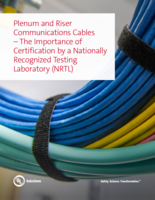
Plenum and Riser Communications Cables - The Importance of Certification by a NRTL
An in-depth examination of the safety risks created by the use of counterfeit, uncertified and self-certified communications cable.

At first glance, all communications cables might appear the same. However, cables manufactured using deficient manufacturing processes and substandard materials pose a significant safety threat. Without third-party certification, which includes such activities as evaluation of the materials and construction as well as testing and surveillance, noncompliant cables running through a structure can actually accelerate the spread of smoke and flame. Unfortunately, it has become difficult for installers to differentiate counterfeits from certified communications cable.
As a vital measure of protection for our own certification marks, UL provides a holographic label for each cable that we have tested and certified, Anthony Tassone, UL principal engineer, told a reporter from Cabling Installation & Maintenance.
“It has multiple security features similar to the technology used in U.S. currency, with embedded code and proprietary color-changing ink, which can be authenticated using a business-card-size reader that is available from UL and CCCA1.”
This whitepaper provides insight on:
Explore the results of our research on this urgently important topic now. Download our whitepaper Plenum and Riser Communications Cables – The Importance of Certification by a Nationally Recognized Testing Laboratory.
References

Plenum and Riser Communications Cables - The Importance of Certification by a NRTL
Our telecommunications cable testing services help you bring your copper communications cables and fiber optics cables to the global marketplace as efficiently as possible.